Posted March 26, 2018 by Nicky in Reviews / 0 Comments
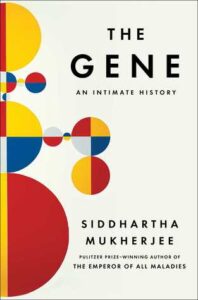 The Gene: An Intimate History, Siddhartha Mukherjee
The Gene: An Intimate History, Siddhartha Mukherjee
The Gene isn’t quite as great as The Emperor of All Maladies: the fact that this isn’t as much Mukherjee’s forte definitely shows, and there’s a couple of points of fact I’d quibble about. For the most part, though, it’s a really great discussion of genetics and the way they actually affect people, tracing a history of mental illness in Mukherjee’s own family as an example. I know this field pretty darn well by this point, and this is far from the first book I’ve read about genetics, but Mukherjee is a good writer, making it all seem fresh and worth reading even when it’s stuff I know backwards and forwards, and probably inside out too.
If you’re curious about genetics, about what genetics can do for us, and about how exactly things like recessive genes and pleiotropy work, this is a good choice. It’s not for experts, but it’s still a pleasant read even if you do know the topic already.
Rating: 4/5
Tags: book reviews, books, non-fiction, science
Posted March 25, 2018 by Nicky in Reviews / 0 Comments
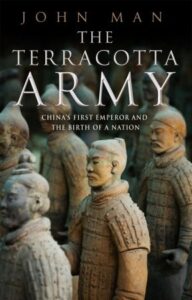 The Terracotta Army, John Man
The Terracotta Army, John Man
The Terracotta Army is great popular history: atmospheric, easy to read, almost a travel guide to seeing the Army in the modern world as well as to understanding its context and how it came to be. Man writes engagingly about the politics that informed the creation of the Terracotta Army and how it was seen, and about the politics which informed the revelation of the Army and the way it is now viewed in the world. He makes a lot of smart points, and though I don’t know the history of the period or the area well enough to judge whether he’s right in his analyses, it seemed convincing to me.
I’m definitely thinking of picking up more of Man’s work; this wasn’t unputdownable, but it was definitely easy to just keep reading instead of finishing a chapter, putting it down, and going to sleep. He brings the events and politics to life very clearly. It doesn’t feel greatly in depth, but it’s entertaining and informative.
Rating: 3/5
Tags: book reviews, books, history, non-fiction
Posted March 20, 2018 by Nicky in Reviews / 0 Comments
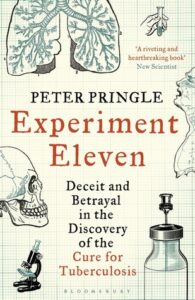 Experiment Eleven, Peter Pringle
Experiment Eleven, Peter Pringle
I initially picked this up because of the subtitle, which specifically mentions the discovery of a cure for tuberculosis. In fact, for the most part it isn’t about the science, but more about the intellectual property battle that surrounded the discovery of streptomycin. It’s more about the two main scientists it discusses, and their struggle over who really found streptomycin. The way the book tells it, I think it’s clear that Waksman was wrong to claim all the credit, and knew he was; Schatz should have received much more credit and recognition for what he did.
It’s interesting in the sense of illuminating what goes on to get drugs from the lab bench to actual development, where Waksman really did play a key role. It might be a bit wearing if you’re not that interested in what’s essentially a biography of the two scientists, though.
Rating: 3/5
Tags: book reviews, books, non-fiction, science
Posted March 15, 2018 by Nicky in Reviews / 2 Comments
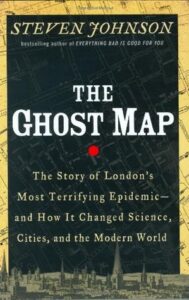 The Ghost Map, Steven Johnson
The Ghost Map, Steven Johnson
This is a really good account of the outbreak of cholera that led to John Snow’s famous map, showing that a particular water pump was the culprit. He traces the history of how London dealt with sewage and how it became such a big issue, and also examines some of the main characters in the drama of trying to stop the outbreak — and trying to challenge miasma theory, which was so much the paradigm at the time. There isn’t a lot of specific science stuff here, but Johnson makes clear why the cholera pathogen is so deadly in a very accessible way.
The only weird part is in the conclusion/afterword to the book, where Johnson talks more generally about the risks to city life and starts discussing nuclear war and terrorism. It seems very much a non-sequitur, and adds nothing to the book to my mind.
Rating: 4/5
Tags: book reviews, books, history, non-fiction, science
Posted March 6, 2018 by Nicky in Reviews / 7 Comments
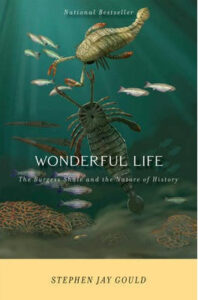 Wonderful Life, Stephen Jay Gould
Wonderful Life, Stephen Jay Gould
Wonderful Life is pretty, well, wonderful. If your curiosity about the Burgess Shale or the weird and wonderful beings of the Cambrian period needs sating, this book should more than do it. It is quite dense — Gould may have been a popular science writer, but he didn’t dumb it down — but it’s worth the time investment.
It’s true that some of the reconstructions of these beings have been challenged since Gould wrote, but it’s still worth reading for his overall theory about the development of life, and much important (and correct) detail about the Burgess Shale.
Rating: /5
Tags: book reviews, books, non-fiction, science
Posted February 25, 2018 by Nicky in Reviews / 0 Comments
 Virus X, Frank Ryan
Virus X, Frank Ryan
This is a bit out of date now, in that there are emerging viruses it doesn’t touch on and scientific advances in studying them that it doesn’t include, but it’s still a fascinating glimpse into some of the emerging diseases of the last century or so, how the outbreaks were handled and what they mean. If you’re read David Quammen’s Spillover, it’s somewhat along the same lines, discussing many of the same diseases; it’s been a while since I read Spillover, so I found this a good refresher on the diseases mentioned and the early stages of their emergence.
If you find this whole subject a little stressful, this won’t exactly be reassuring; it does show that the world simply doesn’t have the infrastructure to deal with the kind of pandemics that are coming our way. We’ve been lucky so far — I’m honestly shocked there’s been nothing worse since this book was published.
Rating: 4/5
Tags: book reviews, books, non-fiction, science
Posted February 22, 2018 by Nicky in Reviews / 6 Comments
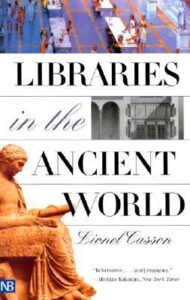 Libraries in the Ancient World, Lionel Casson
Libraries in the Ancient World, Lionel Casson
Libraries in the Ancient World contains a not too surprising round of historical libraries, including of course the Palace of Ashurbanipal and the Library of Alexandria, but nonetheless I found it interesting to read about exactly who libraries were for and how they worked in various societies. Casson’s style is engaging, and I found it just overall the kind of relaxing read about a thing I love that fills an excellent gap without being wildly exciting or revelatory.
I know that seems like faint praise, but I really can’t think of anything else to say! If you want to look at the history of libraries, this makes a good start.
Rating: 3/5
Tags: book reviews, books, history, non-fiction
Posted February 19, 2018 by Nicky in Reviews / 0 Comments
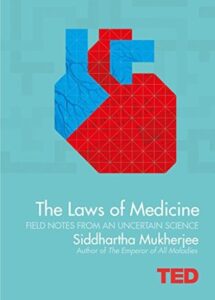 The Laws of Medicine, Siddhartha Mukherjee
The Laws of Medicine, Siddhartha Mukherjee
The description of this book weirdly states that one of the laws Mukherjee proposes is that “Rumours are more important than tests.” That’s not what he suggests: instead, he’s talking about intuition and putting two and two together so that you use the right tests in the right circumstances, reducing the number of needless false positives. He gives an example of realising that one of his patients who didn’t fit the profile was actually a drug addict, leading to being able to use a test for AIDs to figure out what was wrong with him. But doing the test for AIDs makes no sense when there are no risk factors: what really made things come together in this case was a little bit of intuition.
I’m definitely a strong believer in the power of intuition as a diagnostic tool in general. You should always check when you can, of course! But from my vague medical knowledge as a doctor’s daughter and a reader, at seventeen years old, I once realised from something about the way his face looked that someone I knew a little had a serious heart problem. I described what I saw to my mother (the doctor!) and she agreed with my intuition. But when he went to the A&E, they didn’t admit him and didn’t operate. He had an aneurysm, and yes, he died. I wish I could give that moment of intuition and insight to the doctor who saw him in A&E; I’m pretty sure my mother will agree that that intuition, that ability to connect the faintest of dots, can turn an academically good doctor into a great one.
(Yes, Mum, I know. I should be a doctor, but I’m a little old to go through medical school now and maybe my intuition will serve me well in a microbiology lab, too.)
So that rule in particular struck a chord with me, and made reading this worth it just on its own. The other two laws Mukherjee mentions are interesting and important too, but that first one was what really got my interest.
Rating: 4/5
Tags: book reviews, books, non-fiction
Posted February 15, 2018 by Nicky in Reviews / 0 Comments
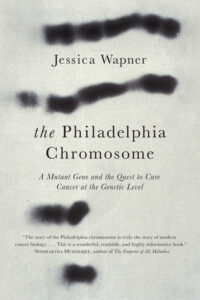 The Philadelphia Chromosome, Jessica Wapner
The Philadelphia Chromosome, Jessica Wapner
If you’ve read The Emperor of All Maladies, you already know a little about the Philadelphia chromosome, but this book goes into more depth on it and focuses exclusively on this form of cancer, bringing in some case studies and describing the scientists and physicians who were intimately involved in the research and the long road to a treatment for the cancer caused by the Philadelphia chromosomal translocation. It’s a fascinating story and well written — actually oddly gripping, if you find research like this interesting. Like a lot of the best books describing research, it made me want to get out there and do some of my own, and maybe someday be as instrumental in saving lives as some of the scientists mentioned.
I was asked with The Emperor of All Maladies if I thought the book would be a stressful read for someone who is afraid of cancer. So the same report for The Philadelphia Chromosome: I think some of the treatments and symptoms described are pretty awful, as you’d expect, but it doesn’t tend to get deeply personal or emotional about them, and the cancer caused by this particular mutation is actually extremely treatable. You might even find it a good place to jump on with learning more about cancer to demystify and undemonise it a little for that reason.
Rating: 4/5
Tags: book reviews, books, non-fiction, science
Posted February 11, 2018 by Nicky in Reviews / 8 Comments
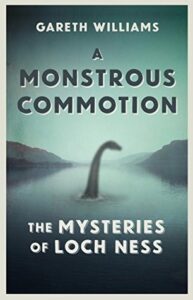 A Monstrous Commotion, Gareth Williams
A Monstrous Commotion, Gareth Williams
After reading his book on polio and his book on smallpox, I wasn’t quite sure what to make of Gareth Williams turning his hand to something like the Loch Ness Monster — but nonetheless, I knew he was a good writer and understands science and the importance of evidence. And Nessie is fascinating, of course; even if there is no Nessie (and I tend to think there isn’t) then it’s fascinating how people have believed there was a Nessie, and spent their whole lives searching for her. I needn’t have worried, anyway: Gareth Williams presents the evidence without much sign of being partial. He notes when people’s evidence was convincing or their testimony likely to be trustworthy, as well as noting when people carried out fakes.
It turns out to be exactly as fascinating as you’d expect, looking at all sorts of people who made or broke their reputations hunting for the monster. In the end, we have very little direct evidence pointing to the existence of a Nessie, so unsurprisingly the book looks at the human side of the drama, along with the sciences that, over time, people have brought to bear on the problem.
I’m sure some writers wouldn’t be able to make this interesting, but to me, Williams did. And if nothing else, he had me wanting to believe in Nessie, for all that he attempted to stay neutral himself (and I wouldn’t like to pin him down on either side of the debate for absolute certain, though I think a lot of people wish it could be true but don’t think it is).
Rating: 5/5
Tags: book reviews, books, history, non-fiction, science
 The Gene: An Intimate History, Siddhartha Mukherjee
The Gene: An Intimate History, Siddhartha Mukherjee








